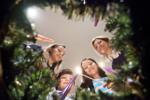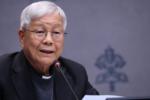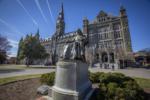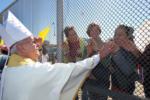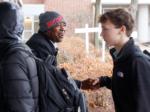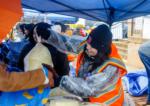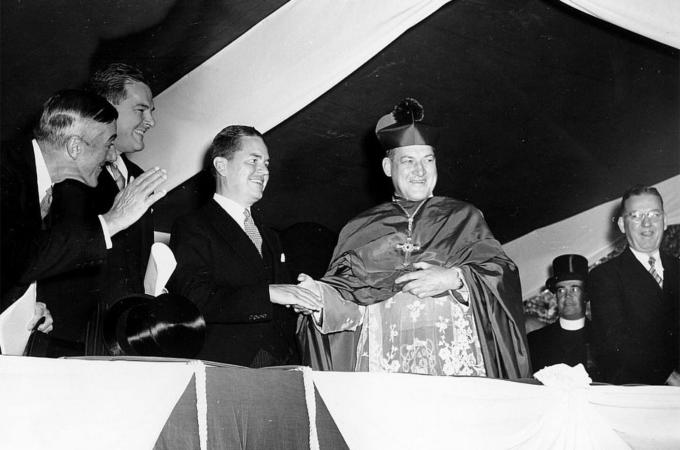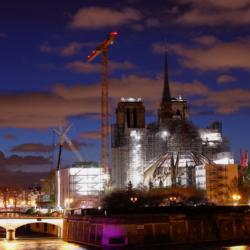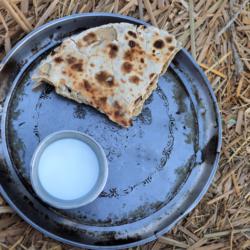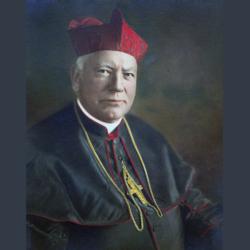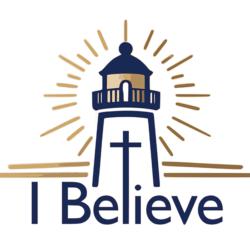Cardinal Cushing urges peace in Vietnam
On July 6, 1970, Henry Cabot Lodge, Jr. wrote a letter to Cardinal Richard Cushing, archbishop of Boston, about his Fourth of July audience with Pope Paul VI. Lodge, who had been the United States ambassador to South Vietnam under the Kennedy and Johnson administrations, was then serving as President Richard Nixon's personal envoy to the Holy See. He spoke to the pontiff about the war in Vietnam and the outlook for peace. "I thought it might interest you," Lodge wrote to Cushing, "to receive a first-hand report from me about it."
Lodge came from a long line of Boston Brahmins with a history of public service. Though his father was a poet, his grandfather, great-grandfather, and great-great grandfather were all United States senators, and Lodge followed in their footsteps before losing his seat to John F. Kennedy in 1952. Eleven years later, as president, Kennedy appointed Lodge to the unenviable post of ambassador to South Vietnam, a nation in turmoil under its leader Ngo Dinh Diem. In his capacity as ambassador, Lodge vocally supported the coup of Diem that resulted in the leader's assassination on Nov. 1, 1963.
The situation in Vietnam rapidly deteriorated after the assassination of Diem, and the United States ramped up its military activities in Southeast Asia under the Johnson and Nixon administrations. But by July of 1970, Americans were war-weary. Peace advocates had, for years, been advocating for a full U.S. withdrawal from Vietnam. It had been five years since Pope Paul VI addressed the United Nations, challenging the Church and the world to embrace nonviolence: "No more war, war never again. It is peace, peace which must guide the destinies of peoples and of all mankind."
The Cambodian Incursion, which began in April 1970, prompted widespread condemnation from even those who had been skeptical of the early peace movement. For the first time, the United States extended the war into neutral Cambodia to root out enemy combatants in its border regions. Anti-war demonstrations surged into violence across the United States. Ohio National Guardsmen shot and killed four unarmed college students during the protests at Kent State University.
Catholic leaders across the country, including Cardinal Cushing, added their voices to the denunciation of the Cambodian Incursion. On May 8, 1970, he issued a statement, calling the campaign "an escalation of conflict which will cost heavily in human life and suffering." He went further, demanding that the Nixon administration "end this war that has been so costly in human life," which had "for large numbers lost its meaning."
Cardinal Cushing's statement on the Cambodian incursion followed years of wrestling with the question of the morality of the war in Vietnam. In his 1966 address to the National Convention of the Catholic Daughters of America, he had asked, "Is it any wonder that voices are raised, at home and abroad, for an end to hostilities? For a negotiated settlement? For any action that will bring about a cease-fire? For peace at almost any price?" Yet, through 1967, the cardinal remained opposed to a unilateral withdrawal of troops, stating that "If withdrawal from Vietnam would bring about world peace ... then we would have the clear duty to hasten the day of withdrawal. But there is no assurance that peace would be consequent upon a plan so simple. There is, on the contrary, much fear that such a course would lead to further warfare."
By 1970, horrified at the mounting violence at home and abroad, Cardinal Cushing called, simply and without qualification, for the war to end "without further delay." Such was his mindset in July when he received Henry Cabot Lodge's letter.
In his report of his July 4 meeting with Pope Paul VI -- his first in his official capacity as presidential envoy to the Vatican -- Lodge wrote, "The Pope expressed his deep dedication to the achievement of peace." Although the men discussed other issues, including the treatment of American prisoners of war in North Vietnam and the epidemic of drug abuse worldwide, the focus of the meeting was on "the various actions to improve the chances for peace."
On July 15, Cardinal Cushing acknowledged Lodge's letter, thanking him for the report of his time with the Holy Father. Regretfully, the cardinal would not live to see peace in Vietnam. He passed away on Nov. 2, 1970.
VIOLET HURST IS AN ARCHIVIST FOR THE ARCHDIOCESE OF BOSTON.



